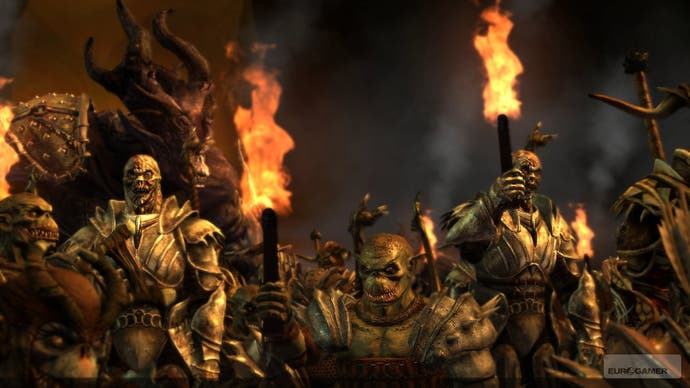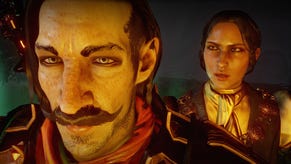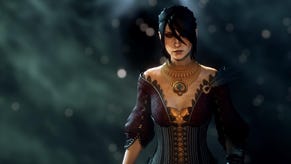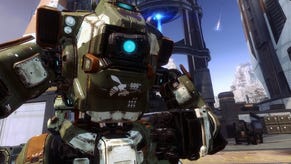Dragon Age: Origins
Dragon drop.
The party we took around the hands-on was four-strong, headed up by one of the six starting characters, a Dalish Elf called Winter. It's an early part of the main story - just an hour or two after the Dalish Elf origin story. There was no mission text, but it's a dungeon crawl: kill everything alive, open every chest, and the biggest guy in there will drop a portal. In this case, we were told that the big guy was an Ogre.
Winter's attacks included the Pommel Strike - an attack with the blunt edge of the weapon, designed to knock the enemy back. She could also gain aggro with her Threaten attack, or choose to land her blows on the enemy's weapon, reducing its damage.
Meanwhile, the nameless Tower Guard we'd recruited played the role of our team's ranged fighter, an archer with a number of accuracy and damage tweaks to his basic shot. His Shield Bash (a power shared with Alistair) had a similar knock-down effect, and could also be used to release party members from the grip of the Ogre before he attempts to mortar and pestle them against the stone floor.
The third character, Alistair, mainly used his shield. Shield Bash, Shield Pummel, Shield Cover - I instinctively assumed him to be a tanking damage sponge, but I didn't get much of a chance to test his hit-point credentials in the short storyline we played through. Also, the lack of an equivalent to Winter's Threaten attack to attract enemy attention away from frailer opponents made me wonder whether his role was slightly more complicated than that.
The Circle Mage had, far and away, the best variety of attacks at this early point in the game. The Glyph of Paralysis helped with crowd control, the Flame Blast created a powerful cone of instant damage with additional damage over time, and the Fireball had an area of effect large enough to make friendly - erm, fire - a concern. Incidentally, if you win the battle still suffering from flame damage, that character will spend the duration of the cut-scene on fire, looking bizarrely philosophical about the whole thing.

As usual, it's the mixture of pausable real-time combat that give you the opportunity to stop panicking, issue individual commands, and behave in a sensible tactical way that very few of us could manage if we were being held in an ogre's sweaty palm. With just one dungeon - and one with very similar enemies, throughout - it's difficult to gauge how compelling the combat will be over the course of the game. Especially without seeing any of the stat development and loot accumulation that makes RPGs like this such an excellent mathgasm. But it's certainly fresh, beautiful wood thrown on the decade-old embers of that Baldur's Gate obsession.
Adding to the decisions you make in dialogue trees, everyone in your party will have a reaction to your in-game performance. If you let them die in battle, they'll be pissed about it. Speaking of which, characters getting knocked down will revive after the threat disappears, but with one of a range of non-crippling debuffs that can only be removed by Apothecary Kits.
Characters who like and trust you will grant certain options and special abilities. Gifts are a good shortcut, and characters like different classes of gift - but you'd be wise to surround yourself with people who agree with the way you've decided to play through the game.

There's nothing revolutionary here - just a sense of polish, professionalism and craft that make it feel fresh. We played on the PC version - BioWare's lead development SKU after Mass Effect and Jade Empire took the console-first path. As a game that's pitched towards the nostalgic PC gamer, it's going to be a bugger to fit onto a control pad. I instinctively used the number and function keys, and relied heavily on the swippiness of the mouse cursor. It's easy to imagine that console owners - if BioWare refuses to simplify the controls - will spend a lot more time with the game paused, while they navigate the screen, and their characters' hotbars.
But, their ports in the other direction have been sound - Mass Effect and Jade Empire both worked well on the PC - and Muzyka says, "It's about a desire to reach as wide an audience as possible. The versions we make, we want everyone who plays the different SKUs to feel like they're getting the best version. So we spend a lot of time on customising the control system, and making it feel right for the system." But then, I suppose he would say that.
Dragon Age: Origins is due out for PC, PS3 and Xbox 360 towards the end of 2009.
















